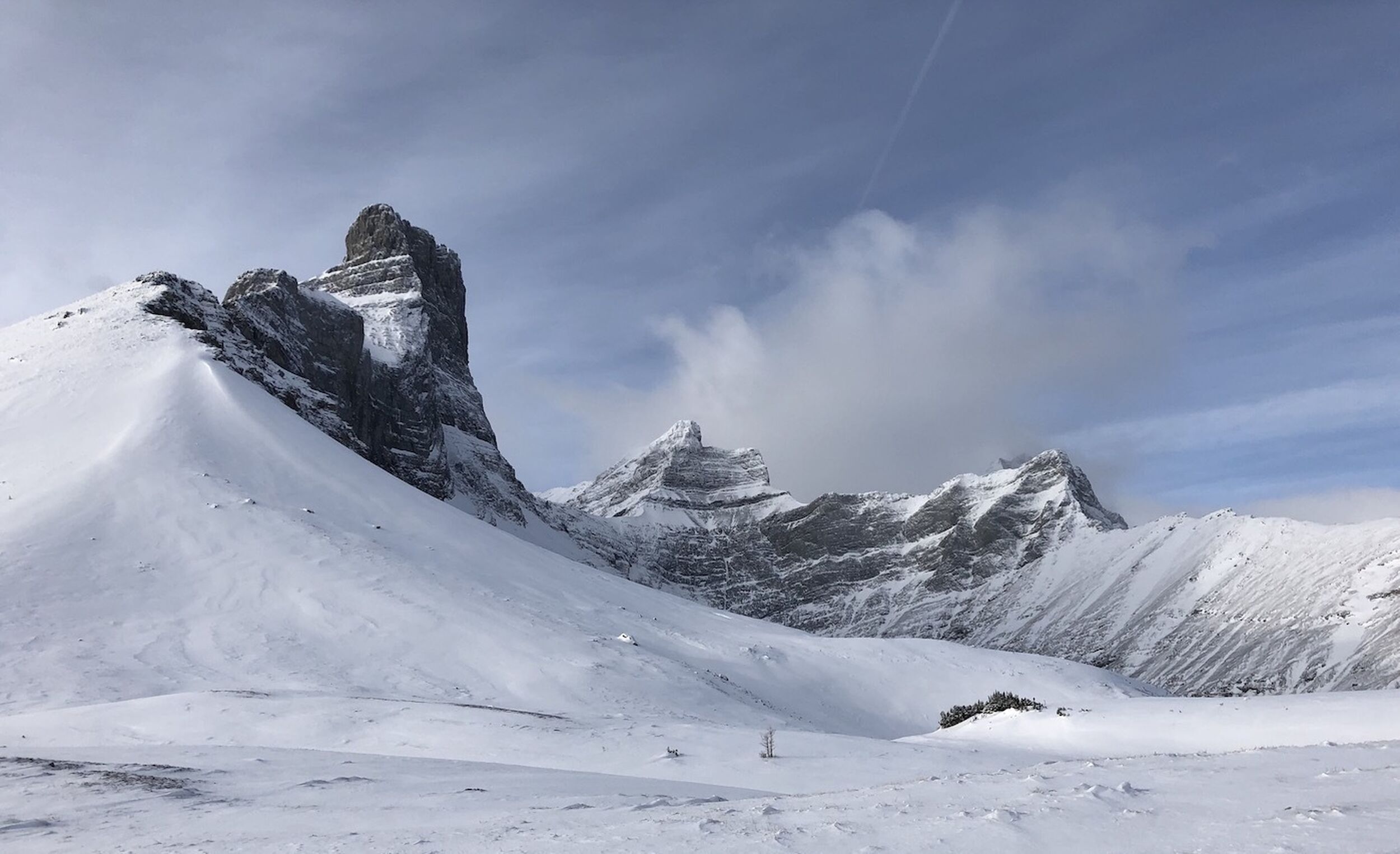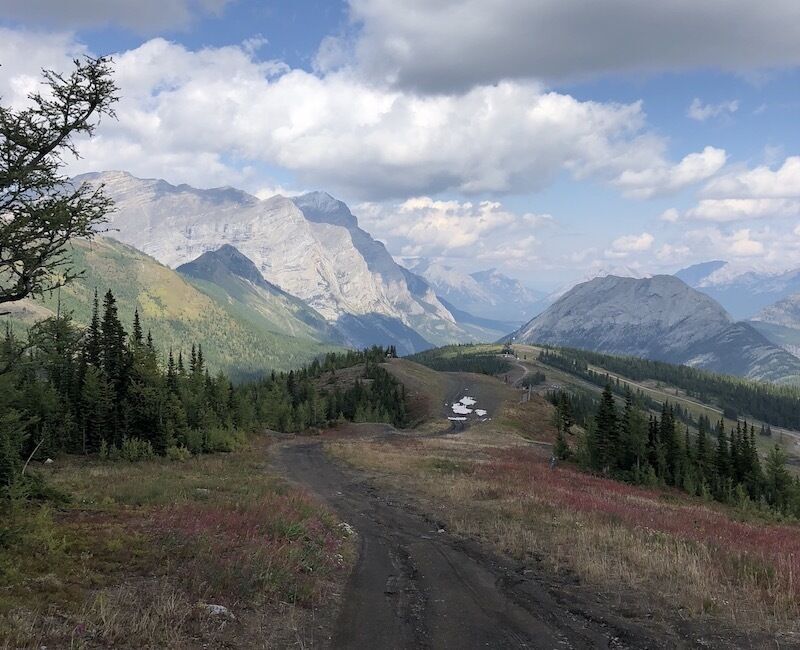
View of Fortress Mountain in the winter. Photo: Dave Robinson
Stoney Nakoda take Alberta to court over water sale
‘Alberta really is acting like it’s 1492.’
Support independent Calgary journalism!
Sign Me Up!The Sprawl connects Calgarians with their city through in-depth, curiosity-driven journalism. But we can't do it alone. If you value our work, support The Sprawl so we can keep digging into municipal issues in Calgary!
“Water is life.”
The phrase has become a cliché, but that doesn’t make it any less true. Water is Earth’s most valuable resource. And where there is value, privatization often follows.
Over the past few years, the Kananaskis valley has had a front-row seat to the workings of water privatization. In recent months, the area has witnessed a battle between Alberta's parks department and the Stoney Nakoda Nation.
Fortress Mountain Holdings (Fortress) is an on-again, off-again ski resort on the slopes of its namesake mountain. In the past, during the “off” periods, the company has made its money through a variety of operations—most notably, as the backdrop of mainstream films and commercials.
A short drive east from Fortress Mountain will bring you to Morley, home to the Bearspaw, Chiniki and Wesley First Nations. These bands of the Stoney (Iyarhe) Nakoda Nation have called Western Canada home since time immemorial, and are subject to Treaty 7 rights.
The Stoney Nakoda do not believe that Fortress’s application is conducive to wise allocation and use of water.
Last year, Fortress set its sights on a new form of cash flow: water.
In October 2019, Alberta Environment and Parks approved an amendment to Fortress’s water licence that would allow the company to sell half the amount of water it had originally approved to use for the resort’s operations and maintenance.
That water—drawn from a tributary of Galatea Creek—is already being canned, sold and marketed as “glacier spring water.” And now the Stoney Nakoda are taking the Alberta government to court over the arrangement, seeking a judicial review.
The Nation says it wasn't adequately consulted about Fortress's amendment and is raising concerns about how the Fortress plan will affect water availability and quality on reserve, along with fish habitat.
“The Stoney Nakoda do not believe that Fortress’s application is conducive to wise allocation and use of water,” said the Nation in a statement submitted to, and rejected by, the Alberta government.
A duty to consult
Indigenous rights are affirmed by Section 35 of the Constitution. Those rights include self-governance rights, land ownership rights and the right to use land and its resources, including the water.
“Within the treaties—all of 6, 7 and 8 treaties—they all state that there's a right to hunt, fish, trap and basically to live the way that Indigenous people live,” said Jesse Cardinal, executive director of Keepers of the Water, an Indigenous-led water advocacy organization founded in 2006.
“We're very land-based people and water keeps everything alive.... Water should not be seen as a commodity to buy and sell.”
Any government decision infringing on treaty rights is subject to the duty to consult and accommodate. That means that the Crown (Alberta, in this case) has a responsibility to engage Indigenous communities to discuss and work to mitigate any negative consequences.
Water should not be seen as a commodity to buy and sell.
But that didn't happen with the Fortress amendment.
Instead, last summer, Alberta Environment allowed public statements of concern about Fortress's application for a month. The Nation rushed to put together a statement which outlined that the site of Fortress’s project, Hatha Tâga Baha, is located on Stoney Nakoda territory.
The Nation noted that the area is significant to the Stoney Nakoda’s hunting, fishing and other treaty rights. It also said Fortress’s extraction of water would negatively impact the Nation.
“Granting the application would undermine the protection of the environment and human health, as well as the protection of a vital ecosystem,” the Nation wrote.
The Alberta government reportedly received nearly 250 statements of concern over Fortress's application, but dismissed them as invalid, granting Fortress approval in late October.
In an October 10 response to the Nation, Alberta Environment said that “the department has determined that no consultation is required in relation to this application.... The application has minimal potential to adversely impact treaty rights or traditional uses.”
'Alberta really is acting like it's 1492'
Malcolm Macpherson is a Vancouver-based lawyer who specializes in Indigenous law. He is representing the Stoney Nakoda in court, and was appointed by the Nation to speak to The Sprawl about the ongoing legal issue.
He says that the lack of timely engagement with the Nation by the province is a breach of the Nation’s constitutional and Treaty 7 rights.
“In practical terms, it means that the Stoney are not being recognized by Fortress Mountain or Alberta as having any Aboriginal and treaty rights over the area,” Macpherson said. “It’s an absolutely absurd position to take.”
The Stoney are bearing all of the adverse consequences of the granting of the licence without any benefit whatsoever.
Fortress first got its water licence in 1968. The original licence granted the company the municipal rights to 100 million litres of water annually for operational use—uses such as cooking, cleaning washrooms, and water supply for staff and resort visitors in general. (The Stoney Nakoda were not consulted about the original licence either.)
Through the amendment, Alberta Environment permits Fortress to bottle and sell half of the water allowed by the original licence. Selling 50 million litres of water per year would be equivalent to approximately 100 million standard single-use bottles.
This volume of water represents almost 3% of the water that Galatea Creek discharges into the Kananaskis River.
“It's only common sense and obvious that they [the Stoney Nakoda Nation] would have a keen interest in any taking or diverting of a key water source that they depend on for survival,” Macpherson said.
By not engaging the Nation in the consultation process, “Alberta really is acting like it's 1492,” Macpherson added.
“The Stoney are bearing all of the adverse consequences of the granting of the licence without any benefit whatsoever. They haven't even been spoken to in a reasonable or thorough manner.”

The Nation has tried different ways to fight the decision. In December, the Stoney Nakoda filed an appeal, which Alberta Environment's board dismissed in February.
By April, the Stoney Nakoda Nation still didn’t have answers—and filed its application for judicial review.
“Alberta, for whatever reason, is choosing to not follow its own law,” Macpherson said. “It sends a very strong, negative—and, dare I say, colonial—signal back to not only the Stoney Nakoda but the other nations in Alberta.”
When contacted about the lack of engagement with the Nation, Alberta Environment declined The Sprawl’s request for comment.
Fortress responded to an interview request from The Sprawl with a brief emailed statement.
“In regards to the water licence amendment; this went through an exhaustive and detailed process with [Alberta Environment],” wrote Chris Mueller, Fortress's director of operations.
“This process included an extensive public consultation in which all Albertans were provided with the fair opportunity to submit statements either for or against the project. The Stoney Nakoda Nation was included in this public opportunity and we have reached out to them on numerous occasions with no response in return.”
"With the amendment’s approval in the fall of 2019, we consider the issue to be concluded and will not be commenting any further on it.”
A 'false promise of public participation'
The Fortress situation is not an isolated case. Over the years, Alberta Environment has gained a reputation for secrecy.
“This is definitely something that I've observed systematically over the years,” said Shaun Fluker, an associate professor of law at the University of Calgary.
In a March article for the Alberta Wilderness Association's magazine, Fluker decried the province's “false promise of public participation,” and said an “open and transparent” environmental impact assessment should have been done.
“Alberta Environment, frankly, just seems to have an odd aversion to public input into its decision-making processes,” he told The Sprawl. “And this fits squarely into that.”
A lack of publicly available information about the Fortress deal made it difficult to understand any negative effects.
Neil Warren, who describes himself as a “concerned Albertan,” first started looking into the Fortress deal in November 2019. Since then, he’s done countless hours of research and put together Conserve Kananaskis—a letter calling for Albertans to pay attention to Fortress’s plans.
“When I first heard that they had applied [for the amendment]... I didn't take any action because I'm like, ‘Oh, that's so absurd. There's no way that's going to be approved,’” Warren said. “Then when it was, that just sort of inspired me to take action.”
Like the Stoney Nakoda, Warren is particularly concerned about the lack of public engagement and dismissal of environmental concerns.
“I do think they [Alberta Environment] did a lot of research, to their credit,” he said. “[But] I don't think that in the studies they've done—I don't think that they can say definitively that this is okay.”
A lack of publicly available information about the Fortress deal made it difficult to understand any negative effects. That's why Warren took his research a step further and obtained several internal Alberta Environment email exchanges discussing the amendment.
In one of those email threads, Linda Winkel, a fisheries biologist for Alberta Environment, wrote that “it is impossible to assess the potential impact of a reduction in water return on fish and fish habitat in the Kananaskis River system.”
Alberta Environment… just seems to have an odd aversion to public input into its decision-making processes.
If the court sides with the Stoney Nakoda, it would mean that legally, Alberta was negligent in its decision and lack of consultation with the Nation. And the amended licence would be invalid.
Now the Nation is waiting for a court date, an already slow process that's further bogged down by the pandemic.
In the meantime, Fortress is allowed to go ahead with its plans and start selling water. The water is currently being sold, in cans, in one location—Rapid Ascent Brewery—under the name rök glacier water. Soon, it will be used to make beer.
“If people want to have a say about what happens to their province then they should be concerned because future decisions might not be open to a public involvement,” Warren said.
“It's so blatantly wrong.”
Hadeel Abdel-Nabi is The Sprawl’s staff writer intern.
Support independent Calgary journalism!
Sign Me Up!The Sprawl connects Calgarians with their city through in-depth, curiosity-driven journalism. But we can't do it alone. If you value our work, support The Sprawl so we can keep digging into municipal issues in Calgary!




